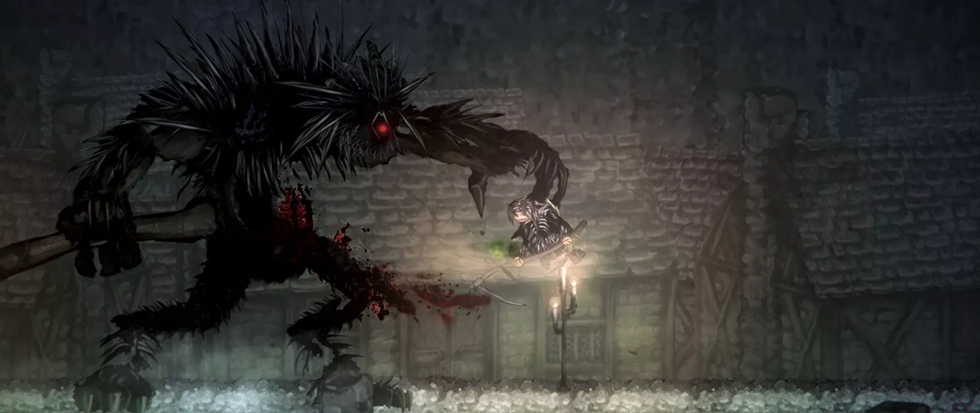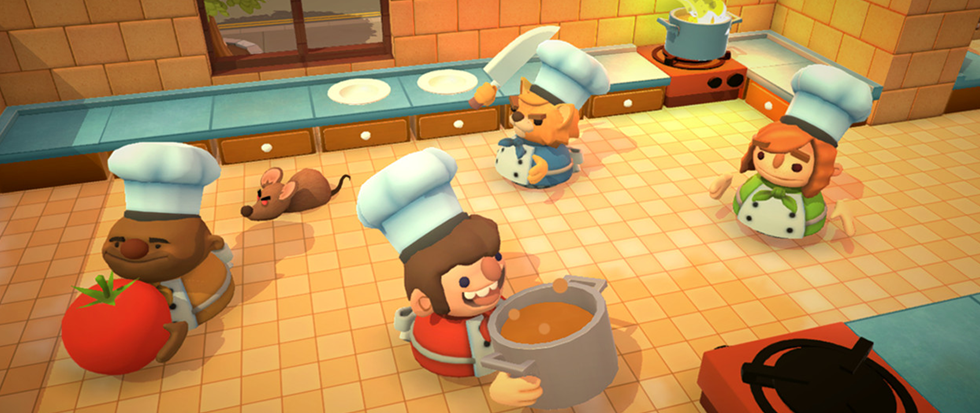
Gurgamoth, Aggression without Nuance
The best competitive games are not truly understood until the end of their natural lifespan, if ever. This doesn’t mean they have to be excessively complicated. Striking this balance between simplicity and nuance – like Samurai Gunn, or Nidhogg, for example – is what separates a mediocre competitive game from a fantastic one. Unfortunately, this is something Gurgamoth doesn’t manage to deliver on.
Gurgamoth is an indie game that pits up to four cultists in an arena where they must sacrifice each other to summon their dark god. It’s all very Cthulhu-esque without being explicitly Lovecraftian, with a presentation that is charming and cartoonish. Each cultist design is memorable (the pink-haired gas mask cultist is a favorite) and the level art, while sparse, is effective. The splatters of blood that stick around are an especially lovely touch.
Unless your opponents willfully kill themselves, you’ll need to encourage them. This means slamming into them to send them careening into one of the many level hazards, or dodging their slams to lead them into a death trap. There is also a stun, but it’s not really that usable.
The balance between slamming and dodging is finely tuned, much like the diving and kicking in Divekick. However, they are so precise and straightforward that there’s not much room for player skill to express itself compared to other games. If you slam at the right time, you win. If you dodge at the right time, you avoid a dangerous hit. There’s no interesting interaction between moves like there is with the sword swing in Samurai Gunn, or the super dash in Towerfall. Gurgamoth is about as subtle as a brick through a window or a punch to the face.
The levels these cultists kill themselves in are also tedious in their similarity and lack of interesting features. Every level is an identically-shaped rectangle with walls that close in periodically. There are differences – a spiky ball here, walls you have to break open there – but the general layout of every level is the same. This leads to some serious fatigue after only a few rounds, as there’s no real change of scenery.
That’s not to say Gurgamoth is not a bad game. It fits solidly within the glut of local multiplayer indie games lately, and offers a fun distraction for those wanting to slam opponents into spikes and dodge tackles. The mechanical loop at the game’s core is solidly built and requires both split-second timing and reading opponent’s patterns, which are the hallmarks of a great competitive game. There’s just no subtlety.
Gurgamoth is much like Starwhal in this respect; the gimmick never offers nuance of control or strategy, and the ideal playstyle is be ridiculously aggressive. Once you’ve played a single round, you understand Gurgamoth completely. While that’s great for a game to bust out for ten minutes at a party while wasted out of your mind, it doesn’t make for a long-lived, competitively-viable title. That’s the game Gurgamoth wants to be, and it doesn’t quite succeed.




